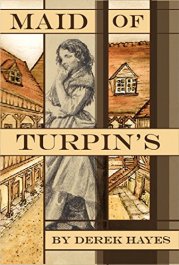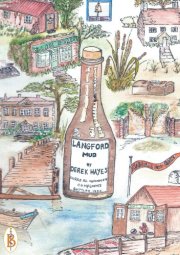As regular Linda’s Book Bag readers
know, I’m always happy to support less well known authors and
publishers so it gives me great pleasure to introduce Derek Hayes today.
Derek’s latest book Maid of Turpin’s was published by Bretwalda Books on 16th July 2016. Maid of Turpin’s is available for purchase here.
Maid of Turpins

The year is 1720 and the government of Prime Minister Robert Walpole is overwhelmed by a criminal scandal which threatens to bankrupt the country. Richard Hamilton secret agent of the crown is sent to investigate. The story centres around the notorious tavern in Honey Lane; a lawless neighbourhood within Cheapside.
Turpin’s is ruled by a feisty young Sybil Turpin; an eccentric character who bathes daily in a hogshead barrel and rides like a highwayman.
She and Richard, himself an unconventional character, start as adversaries but when more brutal criminal activity unfolds, they join forces and their quest leads them around the streets of London, from Tyburn to the Bank of England; through Vauxhall Pleasure Gardens to a prison vault under London Bridge.
Richard Hamilton may have met his match with this bold young woman but the Maid of Turpin’s has a further challenge ahead, far beyond her comprehension or ability.
An Interview with Derek Hayes
Hi Derek. Thank you so much for agreeing to answer some questions on my blog about your writing. Firstly, please could you tell me a little about yourself?I’d describe myself as a well-fed bookworm, people-watcher, storyteller and an expert at make believe. They are lifelong attributes and still as useful now as they ever were. I read a lot and have quite diverse tastes. I usually have two or three books on the go at the same time.
I was a child of the fifties, but I hasten to add a very young one. I live in Wiltshire with my wife Jennifer and lots of grandchildren nearby; still able to indulge the story telling. I spent most of my working life in the NHS and that was where the people-watching began. It was always a privilege being present through the critical times of other people’s life experiences; often of the dramatic and terminal kind. But then there was hospital humour; usually itself profoundly unnerving but always a palliative for the distress and sadness. Experience enough for several lifetimes.
(I bet!)
And tell us a bit about your Langford series of books.

You can read the entire interview HERE
https://lindasbookbag.com/2016/12/10/an-interview-with-derek-hayes-author-of-maid-of-turpins/




